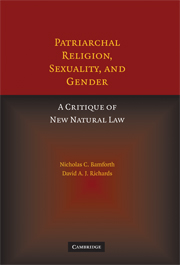Book contents
- Frontmatter
- Contents
- Acknowledgments
- 1 New Natural Law in Context
- 2 Criteria for Evaluating New Natural Law
- 3 The Architecture and Reach of New Natural Law
- 4 Internal Consistency (1): Is New Natural Law Secular?
- 5 Internal Consistency (2): New Natural Law and Thomas Aquinas
- 6 Substantive Appeal (1): What's Wrong with Homophobia and Sexism?
- 7 Substantive Appeal (2): New Natural Law, Sexism, and Homophobia
- 8 Moral Absolutes and the Possible Fundamentalism of New Natural Law
- 9 New Natural Law and Patriarchal Religion
- 10 Concluding Observasions, and Christian Alternatives to New Natural Law
- Bibliography
- Index
4 - Internal Consistency (1): Is New Natural Law Secular?
Published online by Cambridge University Press: 14 August 2009
- Frontmatter
- Contents
- Acknowledgments
- 1 New Natural Law in Context
- 2 Criteria for Evaluating New Natural Law
- 3 The Architecture and Reach of New Natural Law
- 4 Internal Consistency (1): Is New Natural Law Secular?
- 5 Internal Consistency (2): New Natural Law and Thomas Aquinas
- 6 Substantive Appeal (1): What's Wrong with Homophobia and Sexism?
- 7 Substantive Appeal (2): New Natural Law, Sexism, and Homophobia
- 8 Moral Absolutes and the Possible Fundamentalism of New Natural Law
- 9 New Natural Law and Patriarchal Religion
- 10 Concluding Observasions, and Christian Alternatives to New Natural Law
- Bibliography
- Index
Summary
We saw in Chapter 3 that the same basic goods and modes of responsibility (or requirements of practical reasonableness) are deployed by the new natural lawyers in their religious and ostensibly non-religious writings, and that these devices are explained in religious terms in the first context but not the second. Obviously, this begs the question whether it is really possible for the same ideas to operate in both religious and secular senses, depending upon the context in issue: Can the basic goods and modes, presented in religious terms in The Way of The Lord Jesus, also be viewed as reliably secular concepts as they are presented in Natural Law and Natural Rights? More specifically, should the new natural lawyers' arguments about the law's treatment of lesbians and gay men, contraception, and abortion – when they are advertised as being of a secular nature – in fact be understood as religious arguments? These questions, which can be answered by reference to Robert Audi's four alternate criteria, as presented in Chapter 2, for classifying an argument as religious (the argument's content; how it is justified; its author's purposes; and its author's chain of thought) form the central focus of the present chapter.
In relation to Audi's first two criteria, the mere existence of overlaps between the goods and modes when presented in religious and in supposedly secular contexts and terms will not be enough, on its own, to securely demonstrate that the new natural lawyers' arguments must inevitably be categorized as religious.
- Type
- Chapter
- Information
- Patriarchal Religion, Sexuality, and GenderA Critique of New Natural Law, pp. 93 - 150Publisher: Cambridge University PressPrint publication year: 2007



